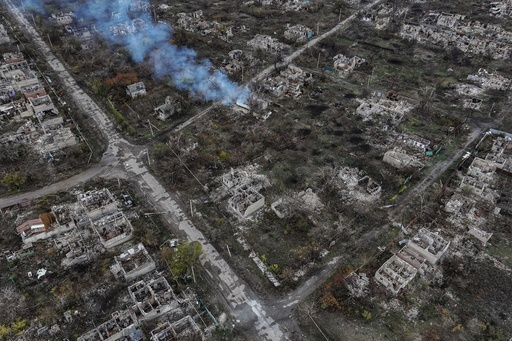KYIV, Ukraine — The Ukrainian Defense Ministry announced the establishment of a new state agency for its armed forces last year, aiming to address the persistent corruption within the ministry’s procurement departments and to drive necessary reform as the country seeks NATO membership.
Known as the State Logistics Operator, or DOT for short, this agency is responsible for procuring nonlethal military supplies, which includes essentials like food, clothing, and fuel. Its CEO, Arsen Zhumadilov, reported that DOT has successfully contracted for 95% of the items it was tasked to supply while achieving a cost savings of 25%. Furthermore, Zhumadilov indicated that plans to begin procuring drones are on the horizon.
This initiative reflects Ukraine’s efforts to implement reforms that are deemed essential for enhancing its prospects of joining NATO, an alliance seen as a crucial counterbalance to Russian aggression. However, questions of NATO membership remain largely political, with some member states cautious about potential provocations from Moscow. Additionally, NATO officials have made it clear that comprehensive anti-corruption measures are a prerequisite for Ukraine’s accession to the alliance.
Implementing change has proven to be a significant challenge for many within Ukraine’s post-Soviet institutions. DOT’s initial successes highlight the ongoing issues faced by Defense Minister Rustem Umerov, including the slow pace of restructuring efforts and ongoing corruption allegations regarding military procurements of lethal weapons.
Umerov has faced scrutiny in the Ukrainian media for appointing ministry officials with whom he has established business relations, among them Zhumadilov. Western diplomats have been observing DOT closely and have expressed satisfaction with its performance so far during its inaugural year, though they requested to remain anonymous to provide candid assessments.
DOT represents a juxtaposition of a modern, tech-savvy organizational culture against the backdrop of an entrenched, bureaucratic institution. The agency’s workspace emits a startup vibe, yet it operates within one of the country’s most inflexible ministries, a reflection of the current dynamics of warfare in Ukraine—where cutting-edge innovation, like drone warfare, exists alongside traditional combat strategies reminiscent of World War II.
“We recognize that we are under the scrutiny of NATO, G7 countries, and all NATO member states regarding whether we can establish a procurement system that is robust, effective, efficient, and resistant to corruption,” Zhumadilov stated.
Under previous Defense Minister Oleksii Reznikov, nonlethal military purchases became embroiled in two significant corruption scandals—one involving inflated food prices, and another linked to substandard winter jackets. As his successor, Umerov has positioned DOT not merely as an agency but as the foundation for a reformed public procurement system within Ukraine’s defense sector, a task assigned to him directly by President Volodymyr Zelenskyy, who emphasized the need for transparency in defense procurement.
Zhumadilov, known for his influential role in public procurement reforms with roots in Crimea, was selected for his proven track record, having previously led Ukraine’s procurement of medical supplies prior to his appointment by Reznikov.
The agency’s workspace features a unique blend of inspirational visuals curated by the marketing team, including images of military vehicles alongside whimsical items such as puppies and branded merchandise. The staff’s attire—oversized hoodies and casual shirts—contrasts sharply with the military uniforms worn by personnel from the Defense Ministry.
In a bid to promote transparency, DOT has introduced DOT-Chain, an innovative IT system aimed at streamlining and digitizing the supply process for the military—from the initial application to invoice issuance. Developed by a skilled IT team within DOT, this system is expected to reduce delivery time significantly while aiming to encompass various military supplies in the future.
Nonetheless, the road has not been entirely smooth; a proposed merger with the Defense Procurement Agency for lethal supplies was halted due to NATO’s advice, casting doubt on Umerov’s leadership decisions and raising concerns over potential personal biases.
Umerov openly acknowledged the historical prevalence of corrupt practices in defense procurement in Ukraine, stressing the urgency of moving away from the old “Soviet, oligarchic” management of public resources. However, overcoming these deeply ingrained practices is challenging.
Zhumadilov pointed out that resistance persists among some ministry officials who remain attached to traditional methods. “We aim to collaborate with our colleagues at the Ministry of Defense and the Armed Forces, yet as an autonomous agency, we strive to maintain our distinct culture,” he explained.
Despite efforts to reduce bureaucratic burdens through DOT-Chain, there remains hesitance from some officials who prefer the familiarity of traditional paperwork, complicating efforts to modernize operations. “They insist on continuing their paperwork ritual,” Zhumadilov commented, “While we argue that the volume of paperwork is simply unsustainable.”


